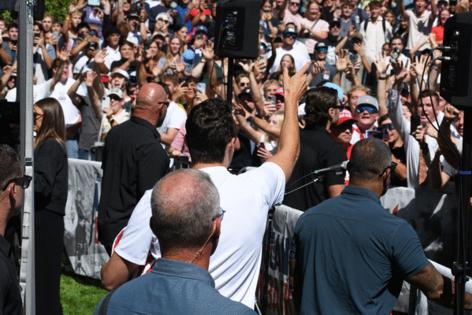Charlie Kirk rallied young conservatives on campus and online: 'He was one of us'
Published in News & Features
Charlie Kirk’s legacy of helping President Donald Trump win re-election and engaging young conservatives stems from his physical and virtual proximity to Gen Z.
The 31-year-old right-wing political activist who was killed last week while speaking at Utah Valley University was known for his presence on college campuses. That was both through his organization, Turning Point USA, with more than 850 chapters in American high schools and postsecondary schools, including several in Minnesota, and his open-mic debates with students.
“His biggest appeal was that he was unafraid to go to college campuses and set up a microphone,” said AK Kamara, Minnesota’s RNC committeeman who was chair of the Minnesota College Republicans in 2009. “He said, ‘If you disagree with something I’ve said, you’re the first in line.’”
Another reason Kirk was so popular with young voters — and so effective in mobilizing them — was his constant communication with millions of supporters and antagonists via the digital platforms where most Gen Zers spend hours a day. His frequent, unfiltered messages, including railing against transgender rights and diversity, equity and inclusion initiatives, often enraged progressives.
Yet some conservatives thought Kirk came off as more authentic than many politicians with their carefully curated remarks.
“He was one of us, in a way,” said Christopher Flemming, president of St. Olaf’s chapter of Turning Point and current chair of the Minnesota College Republicans.
Flemming said Kirk appealed to him and his peers for his youthfulness and the way he engaged directly with students on their turf, not as an elected official but as a political activist heeding democracy’s call.
Over the past several decades, young voters have tended to favor Democratic candidates. But liberals nearly lost that advantage in the last election, with Harris garnering 51% of voters ages 18–29, to Trump’s 47%, according to an AP VoteCast survey.
In Minnesota, liberals still dominate the cohort — the same survey found voters here in that age bracket preferred Harris by 18 points — leaving some young conservatives feeling isolated.
Twin Cities-based GOP strategist Preya Samsundar who is the same age as Kirk, said she has sensed that being among the Republican minority in her home state made her a target ever since she was a University of Minnesota student walking across the Washington Avenue Bridge and seeing that only College Republicans had their signs vandalized.
“Young Republicans especially have just been feeling like they need to shut up and be quiet,” she said. “They can’t wear their conservative values on their sleeves the way that Democrats can without being retaliated against or condemned or looked at funny.”
Kirk’s gatherings, including his American Comeback Tour, which was scheduled to come to the U next week, were a welcoming place for conservative students afraid of being ostracized for their views, especially Kirk’s large, highly produced rallies.
Kamara, who has attended three, said they had a concert-like energy, with massive screens, blaring music and pyrotechnics, and premium seating reserved for students. Kirk’s legions of fans, and rock-star treatment of them, offered wary young conservatives strength in numbers and the sense that their voice was important.
“There’s a high cost to express your ideological beliefs if they are right of center on college campuses,” Kamara said. “There were so many young people that felt inspired by Charlie, because it’s like: Wait, you’re saying I can be bold, and that there’s more of us than we realize, so we should be able to go out there and have these conversations and stand for our beliefs and our values.”
Kirk was tactically effective in translating Trumpism for young people, Kamara said, by focusing on their concerns about getting jobs, buying homes and establishing families, and then having his Turning Point groups register students to vote and recruit them to help with campaigns.
State Rep. Max Rymer, a first-term Republican representing Chisago County who is in his early 30s, said that Kirk’s legacy should be his focus on attacking others’ ideas versus their character. “Words are not violence,” Rymer said. “There is not a justification to meet what you or I might perceive as hostile words with a bullet. If that’s who we are becoming as a country, we’re not going to have a country.”
Kamara noted that Kirk’s digital media — which includes viral video clips of him leaving students 10 years his junior stammering and his hundreds of hours of podcast episodes — will continue to exert influence after his death.
The day after Kirk’s killing, Kamara was scrolling TikTok when video footage of Kirk’s final day popped up: “He’s looking at the camera, and he’s like, ‘I’m here at Utah Valley, and this is gonna be an amazing event,” Kamara recalled. “That post had, like, 10 million likes and hundreds of millions of views.”
_____
©2025 The Minnesota Star Tribune. Visit startribune.com. Distributed by Tribune Content Agency, LLC







Comments